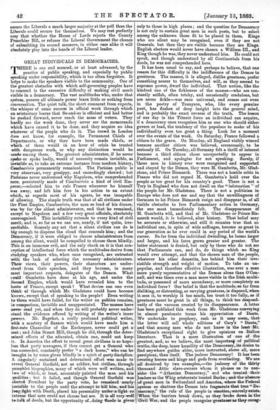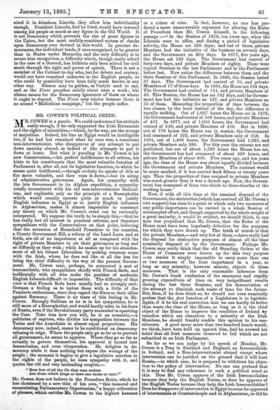GREAT INDIVIDUALS IN DEMOCRACIES.
THERE is one end secured, or at least advanced, by the practice of public speaking, and especially by public speaking under responsibility, which is too often forgotten. It helps to make the speakers visible to the community. One of the greatest obstacles with which self-governing peoples have to contend is the excessive difficulty of making civil merit visible in a democracy. The vast multitudes who, under that system, possess all ultimate power learn little or nothing from conversation. The quiet talk, the short comment from experts, • the whisper of some success in official work through which an aristocracy learns that So-and-so is efficient and had better be pushed forward, never reach the mass of voters. They hardly see the work done, they never see the memoranda which have caused it to be done, and they acquire no idea whatever of the people who do it. The crowd in London does not know, for example, the Permanent Chiefs of Departments, or why they have been made chiefs, or which of them would in an hour of crisis be trusted with dangerous work, or why- any distinction would be mvide among them. The greatest administrator, if he never spoke or spoke badly, would of necessity remain invisible, as invisible as, to take an extreme instance from modern history, Conabaceres permanently remained. The Parisian public is very observant, very gossippy, and exceedingly shrewd ; but Parisians never understood why Napoleon, who comprehended men, persistently made of Cambaceres a kind of civil Em- peror,—selected him to rule France whenever he himself was away, and left him free in his action to an extent which, as regards most of his agents, he was incapable of allowing. The simple truth was that of all civilians under the First Empire, Cambaceres, the man so fond of his dinner, was by far the ablest administrator, and that he remained, except to Napoleon and a few very great officials, absolutely unrecognised. This invisibility extends to every kind of civil merit, and is, so far as we can see, nearly, if not quite, irre- mediable. Scarcely any act that a silent civilian can do is big enough to disperse the cloud that conceals him.; and the Democracy, if it were obliged to choose administrators from among the silent, would be compelled to choose them blindly. This is an immense evil, and the only check on it is that con- ception of intellectual force which the multitudes derive from studying speakers who, when once recognised, are entrusted with the task of selecting the necessary administrators. Their views, their powers, their characters are under- stood from their speeches, and they become, in many most important respects, delegates of the Demos. What ceold. Gambetta have done at his age, and under the Second Empire, which would have revealed him to the hosts of France, except speak ? What device can one even think of through which Mr. Gladstone could have become known, except that of speaking to the people? Even writing to them would have failed, for the writer on politics remains, in comparison, invisible and unappreciated. The masses have never read yet, and when they do will probably never under- stand the evidence offered by writing of the writer's inner powers. Mr. Bagehot, a really profound political writer, with a mastery of finance which would have made him a first-rate Chancellor of the Exchequer, never could get a seat ; and John Stuart Mill, though he did, through the deter- mined efforts of the educated, obtain one, could not keep it. In America the effort to reveal great civilians is so hope- less that party managers, if they cannot get a General who has succeeded, constantly prefer "a dark horse," who can be brought in by votes given blindly in a spirit of party discipline. A singularly sustained and determined effort was made to' reveal General Garfield, not .as soldier, but civilian, through pamphlet biographies, many of which were well written, and two of which, at least, accurately painted the man and his qualities ; but it failed, and though General Garfield was" elected President by the party vote, he remained nearIr
invisible to the people until the attempt to kill him, and his• leog,fight with Death, placed his personality under e light eo intense that men could not choose but see. It is all very weir. te-talk of deeds, but the opportunity of, doing 'deeds is given
only to those in high places ; and the question for Democracy is not only to sustain great men in such posts, but to select among the unknown those fit to be placed in them. Kings who are silent may be recognised, even if they are not Generals, but then they are visible because they are Kings. English electors would never have chosen a William In., and King though he was, they never understood him. He could not speak, and though understood by all Continentals from his deeds, he was not comprehended here.
It has been usual to say, and perhaps to believe, that one reason for this difficulty is the indifference of the Demos to greatness. The masses, it is alleged, dislike greatness, prefer something nearer to themselves, and will, as they ascend to supreme power, dwarf the individual. That notion, like the kindred one of the fickleness of the masses—who are con- stantly selfish, often tetchy, and occasionally credulous, but are never fickle—was once universal, and comes out even in the poetry of Tennyson, who, like every genuine poet, has flashes of deep insight into the oeneral mind, and is probably the exact reverse of the truth. The lesson of our day is the Titanic force an individual can acquire, if a democracy once recognises him as one who should either govern or lead, the tendency of the populace to make of his individuality even too great a thing. Look for a moment over the events of the week. On Saturday, France followed a citizen to the grave. On Monday, all England visibly winced because another citizen was believed, erroneously, to be seriously ill. On Tuesday, all Germany felt a thrill of interest because a third citizen chose unexpectedly to appear in Parliament, and apologise for not speaking. Surely, if three men in history ever were recognised and supported and obeyed by the Demos, they were M. Gambetta, Mr. Glad- stone, and Prince Bismarck. There was not a hostile critic in France who did not regard M. Gambetta's hold over the people as too great for his country's good. There is not a Tory in England who does not dwell on the "infatuation " of the people for Mr. Gladstone. There is not a politician in Europe who does not see and say that the unwillingness of Germans to let Prince Bismarck resign and disappear is, of all visible obstacles to free Parliamentary action in Germany, the one most immediately felt. The disappearance of M. Gambetta will, and that of Mr. Gladstone or Prince Bis- marck would, it is believed, alter history. That belief may be accurate or otherwise, and still it remains true that an individual can, in spite of wide suffrages, become as great in our generation as he ever could in any period of the world's career. So far from the individual dwindling, he looms larger and larger, and his force grows greater and greater. The latter statement is denied, but only by those who do not see that Parliaments can, and do, do things which no King would ever attempt, and that the chosen man of the people, whatever his other demerits, has behind him their irre- sistible strength and weight of motion. To take an un- popular, and therefore effective illustration, was ever a man more purely representative of the Demos alone than O'Con- nell, and was there ever a man more visible in the Irish multi- tude, or possessed of more ascendancy, or more completely an individual force ? Our belief is that the multitude, so far from disliking, or distrusting, or envying greatness, is disposed, when it sees it, to worship it too much, too trust it too fully, as if greatness must be great in all things, to think too despond- ently of the vacuum created by its disappearance. A letter has been published this week from Mr. Gladstone conveying in almost passionate terms his appreciation of Dante. We undertake to prophesy, rash as it may seem, that the letter will sell whole editions of Cary's " Dante," and that among men who do not know in the least Mr. Gladstone's exceptional right to give opinions on Italian literature. That is a mere illustration of one of the greatest, and, as we believe, the most importan+ of political truths, the deep, inner humility of the Democracy, its desire to 'nd anywhere guides abler, more instructed, above all, more percipient, than itself. The jealous Democracy! It has been !creating heroes and kings and gods from everlasting. We are all deceived by two examples,—the jealousy of the thirty thousand Attic slave-owners whom it pleases -as to 'con- sider the " Athenian Democracy," and who treated their
Readers as the Whig aristocrats treated Burke; and the absence of great men in Switzerland and America, Where the Federal system so shatters the Demos into fragments that true-" De-
fmocracy,” the rale of the people in emotion, scarcely exists. When the barriers break down, as they broke down in the Civil War, and the people recognise greatness;as they meg-
raised it in Abraham Lincoln, they allow him individuality enough. President Lincoln, had he lived, would have towered among his people as much as any figure in the Old World. It is not Democracy which prevents the rise of great figures in the Union, but the most craftily-combined system of checks upon Democracy ever devised in this world. In genuine de- mocracies, the individual tends, if once recognised, to be greater than in States under Monarchs, and the only difficulty is to secure him recognition, a difficulty which, though easily solved in the case of a General, has hitherto only been solved for civil merit through the right and power of speech. There is not a member of the Cabinet to-day who, but for debate and oratory, would not have remained unknown to the English people, or who could by possibility have been fully made known in any other way. Silence may be golden, as Carlyle used to say, and as the Times preaches noisily about once a week ; but silence means for the Democracy ignorance of those on whom it ought to depend. The Times may rejoice because there is no second "Midlothian campaign," but the people suffer.



































 Previous page
Previous page